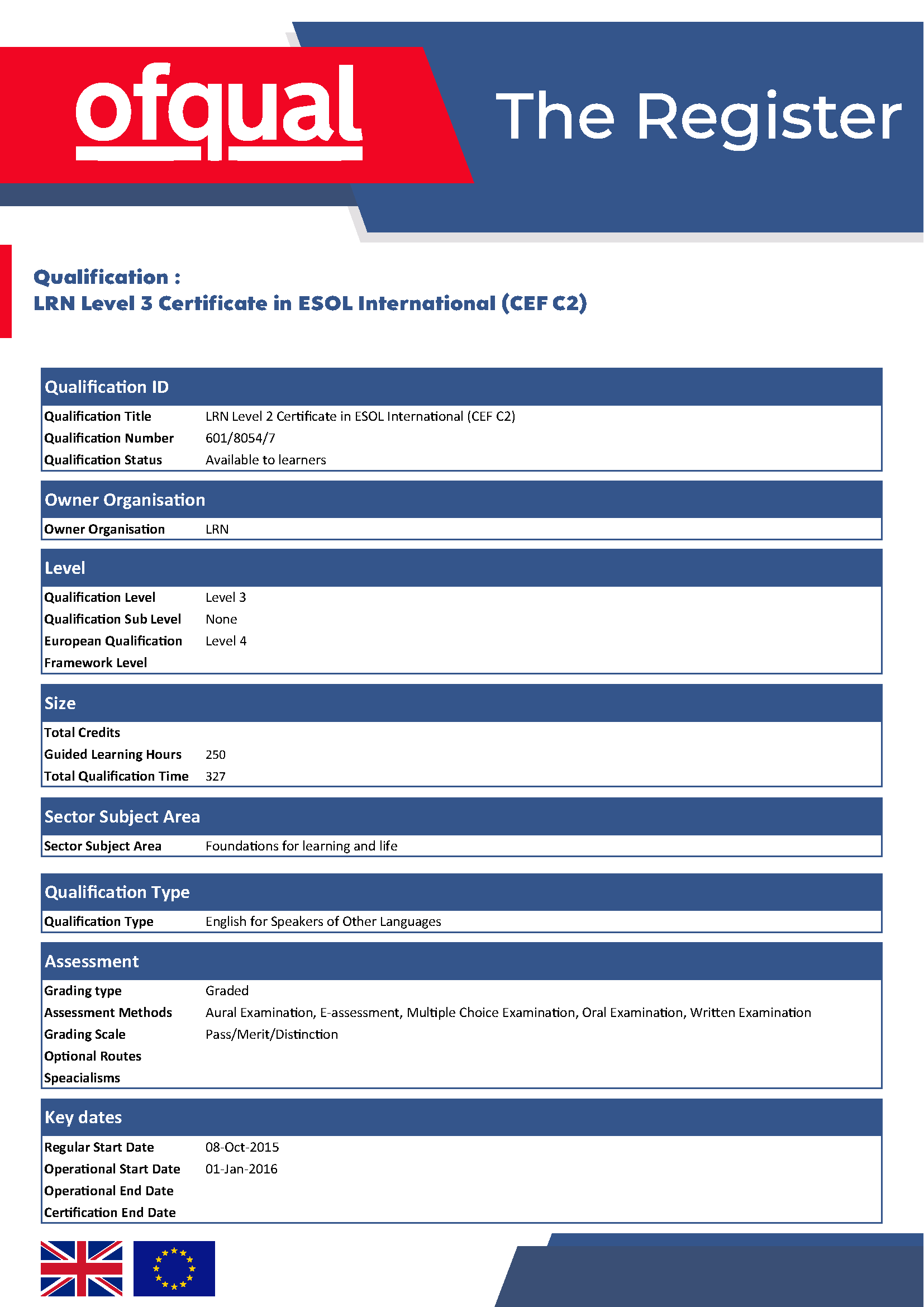CEFR English level C2Inspection and accreditation code of the UK government: Ofqual 601/8054/7
According to CEFR English level C2 and the London Language College’s CEFR English level C2 standards, learners can easily understand most spoken and written literature after completing the programme. Can instantly express logical rearrangement and presentation and accurately distinguish the different subtle meanings in complex situations.
LRN Level 3 Certificate in ESOL International (CEFR C2), inspection code Ofqual 601/8054/7, is an English programme that meets the UK’s CEFR English level C2 is recognised in the UK, Europe and most countries and territories, including Vietnam.
Learners can learn, practice and have global exams through London Language College’s PPP (Practice & Preparation Provider).
CEFR English level C2 has an inspection code of the British Government Ofqual 601/8054/7. Check here.
Training programme
CEFR English C2 includes classroom activities combined with the online review system. Step by step, each lesson will help learners understand the LRN CEFR C2 exam structure and have the best preparation before entering the LRN UK’s global exam.
In this section, participants are provided with:
- Sample test
- Introduction of the exam process
- The process of marking and announcing the results
- Certification process if passed
- Re-examination process if not passed
- The mock test before the official exam
Training listening skills in CEFR C1 learners
Overall listening skills
- Can follow and understand the lectures or disciplines that use colloquial expressions containing cultural factors or unfamiliar terms.
- Can understand delicate, complex, or controversial issues such as law, finance, and even reach the knowledge level of an expert
- Can listen to and understand everything easily at the speed of native speakers.
Listening to the interaction between native speakers or those who are not directly conversing with
- Can follow and easily understand complex conversations and chats between native speakers in debates and group discussions, even if the content is on abstract, complex and unfamiliar topics and using various idioms.
Listening to presentations and conversations
- Can follow and understand specialised lectures and presentations that use many idioms and dialects.
Listening to announcements, instructions, instructions
- Can understand all the announcements and instructions, whether heard directly or through the media, without having difficulty even in noisy environments.
Listening to the radio and watching television
- Can enjoy all radio or television programmes without any effort
Training speaking skills in CEFR English level C2
Overall monologue skills:
- Can convey the nuances of subtle meaning accurately using various types of modifiers with excellent accuracy
- Use the idiomatic or colloquial expressions proficiently with a clear understanding of the levels of meaning. Can change the wording to avoid difficulty in communication and express it so fluently that other people hardly notice it.
Monologue: Describe the experience
- Can describe clearly, detailed, elaborately, and fluently help listeners understand and remember it easily.
Monologue: Argument
- Can argue systematically, emphasise the important points with relevant illustrative details
Monologue speaking: Presenting to the audience.
- Can confidently and explicitly present a complex topic to a stranger using structures and skillfully adjust the conversation to the listener’s needs.
Overall interactive speaking:
- Can use idioms, colloquialisms and be aware of the sense of metaphors. Can convey the nuances of meaning using precise and sensible nuances of expression. Can change the wording so smoothly that other people hardly notice it.
Interactive speaking: Conversations
- Can chat comfortably about personal and social life without being impeded by the limitations of language.
Interactive speaking: Transactions of goods and services
- Can use the language to negotiate a solution for disputes such as travel tickets, poor services, financial liability for damage or liability for goods and services that do not comply with the contract.
- Can draft a compensation script, using persuasive words to achieve satisfaction, and clarify the limits of any concessions prepared.
Interactive speaking: Interview
- Can maintain personal point of view during the interview, rearrange and reorganise the contents of the exchange consistent with the expression style of native speakers
Pronunciation and fluency
- Can change intonation, rhythm and place the correct stress to express subtle nuances of meaning.
- Can express long personal ideas naturally, spontaneously and without hesitation. Just stop to choose the most extensive words to express personal thoughts or find the appropriate examples and explanations.
Accuracy and relevance for sociolinguistics
- Can use correct, appropriate, and effective pronunciation, vocabulary, and grammatical structures in communication.
- Use the idiomatic or colloquial expressions proficiently with a clear understanding of levels of meaning.
- Can fully perceive the sociolinguistic and sociocultural effects of the language used by native speakers and respond to them appropriately.
- Can effectively act as a bridge between a foreign language user and a mother tongue speaker, aware of the sociocultural and linguistic-cultural differences.
The level of completing the exam mission
- Complete exam tasks effectively; the answers are frequently matched.
Training reading skills in CEFR English level C2
Overall reading skills
- Can understand, select, and critically use most texts, including abstract, complex structures, or literary and non-literary works.
- Can understand various long and complex documents, perceive the small differences between literal and figurative styles
Reading for information and arguments.
- Can comprehensively understand various types of long, complex documents commonly encountered in social life, in work or academic environments, and identify subtle details such as implicit or explicit attitudes or opinions.
Reading for orientation
- Can quickly skim long and complex texts to locate useful information.
- Can quickly determine the content and usefulness of the articles and reports covering a wide range of professional topics to decide whether to read more carefully.
Reading correspondence
- Can understand all kinds of letters, but sometimes need to use a dictionary.
- Can fully understand long, complex instructions on a new machine or process, even if it is not relevant to personal expertise. But still, need to re-read difficult sections.
Reading for word processing.
- Can summarise information from various sources, make arguments and give evidence to restate the issues logically.
Training writing skills for CEFR English level C2
Overall productive writing
- Can write fluently, closely arranged and detailed articles with appropriate style and logical structure, helping readers see the crucial points of the writing.
Productive writing: Creative writing
- Can write articles describing experiences and stories clearly, coherently with extensive and attractive vocabulary, and the writing style is appropriate with the chosen genre.
Production writing: Writing reports and essays
- Can write complex reports, articles or essays clearly and coherently with extensive vocabulary on a specific issue, make harsh judgments about proposals, or comment on literary works.
- Can provide appropriate and effective logical structures to help readers see the significant points.
Interactive Writing: Overall interactive writing
- Can express oneself clearly and accurately, connect with the interlocutor flexibly and effectively
Interactive Writing: Correspondence
- Can express oneself clearly and accurately in personal correspondence, using flexible and useful language, including recounting emotions, allusions, and jokes.
Interactive writing: Taking notes, Texting and Filling in informs
- Can write simple informational notes about friends, services staff, teachers, and people that often meet in everyday life, clarifying the important points in messages.
- Can understand messages with requests or problem explanations.
Word Processing
- Can summarise information from various sources, thereby demonstrating the ability to restructure the arguments and articles about the overall results coherently.
Common language criteria
- Can use the language in a wide range, capable of controlling words consistently to express thoughts accurately, emphasise, distinguish and eliminate obscure elements. Show no limits of what the writer wants to convey.
Vocabulary range
- Proficient in a wide range of vocabulary, including idiomatic phrases and colloquialisms, recognise the levels of expressive meaning.
Control of vocabulary
- Always use words accurately and appropriately
Grammatical accuracy
- Always maintain grammatical control over complex language structures even when paying attention to other things such as preparing for the sequels or watching other people’s reactions.
Orthographic accuracy
- No misspelling in writing
18-minute Speaking exam


60-minute Writing exam

35-minute Listening exam

60-minute Reading Comprehension exam

Marking and result evaluation

Results Information
Process of announcing the CEFR English exam results:
- Exam report – Statement of Result (SoR) & e-certificate within 30 working days. SoR will email each candidate or send the report via the PPP system of London Language College.
- Hard-copy certificates will be delivered within 45 working days upon the date of result availability. Candidates can also contact authorised PPPs of London language college to receive.
For further information, please get in touch with PPPs of London Language College.
Receptive skills after LRN CEFR C2
Listening skill
- I have absolutely no difficulty understanding all types of speech, whether heard in person or through the media, even when the words are delivered at native speakers’ speed, as long as I have some time to get used to the voice.
Reading Skills
- I can critically understand and analyse almost all texts, including abstract, complex structures and linguistics, or literary and non-literary works. I can understand various long and complex texts and perceive the small differences between writing styles and allegorical and contemporary meanings.
Interactive skills after LRN CEFR C2
Interactive speaking
- I can participate in any conversation or discussion without difficulty using idioms, colloquial language. I can express myself fluently and convey subtle, precise semantic nuances. If having any troubles, I can speak it in another way so skillfully and fluently that it is difficult for those talking with me to notice.
Interactive writing
- I can write responses in an exact, accurate, flexible, and effective way with an appropriate style.
Applicable skills after completing LRN CEFR C2
Speaking
- I can describe or argue clearly and fluently in a context-appropriate style with effective logical structures that make the listener pay attention and memorise the significant points.
Writing
- I can write a clear, coherent essay with the appropriate style. I can write complex letters, reports, or articles presenting an event with a logical, efficient structure so that the readers can recognise and remember significant points. I can write summaries and reviews of my professional works as well as literary works.

